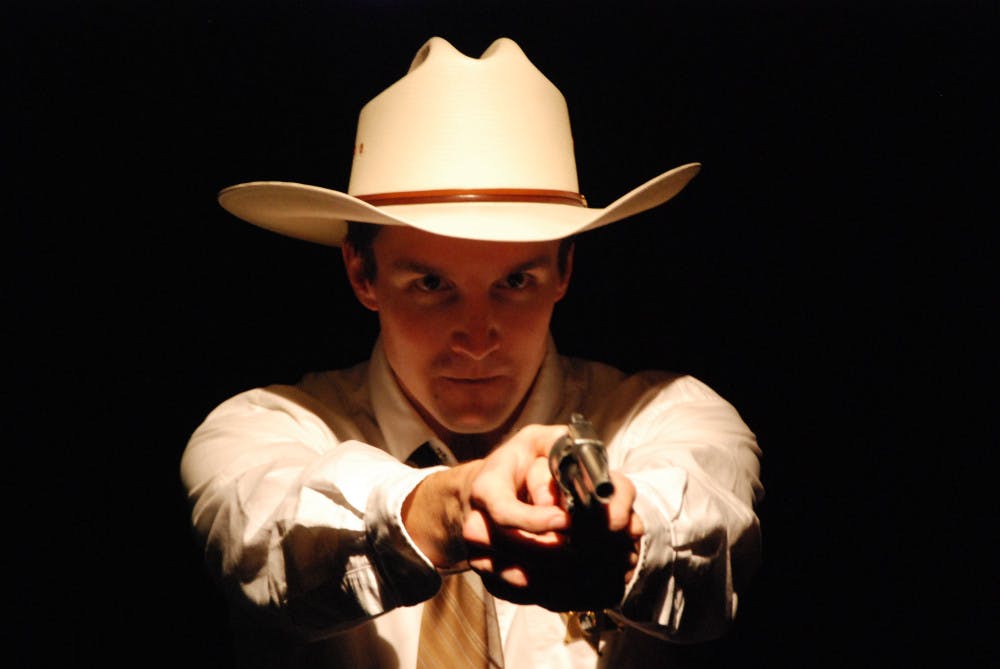This past weekend, Greater Tuna ran in the Hepburn Zoo from Oct. 25 - 27. The show was directed by Teddy Anderson ’13.5 and performed by Nathaniel Rothrock ’12.5 and Nicholas Hemerling ’15. This play was Rothrock’s 700-level senior work for the theater major.
The highlights of the two-man show were the many character swaps that occurred throughout the performance. Each character had unique quirks, which required talent on Rothrock and Hemerling’s part to master and effortlessly switch between them. The costume changes were swift and oftentimes dramatic, such as when Hemerling and Rothrock strutted about the stage in drag — a feat made possible by the talents of costume designer Emily Jacke ’13.
The play begins with Rothrock’s and Hemerling’s portrayal of two incompetent radio personalities at a local radio station in the fictional town of Tuna, Texas. After a few minutes of their bumbling broadcast, they realize that the “on air” light was never on in the first place, and this becomes a running gag throughout the rest of the performance. This opening act was enough to get the audience roaring, but the laughs only increased as the actors embodied more and more characters throughout the play.
Rothrock stole the show as Bertha Bumiller, an overweight mother of three children. His acting chops shone through in his interaction with imaginary dogs (“eight to 10 of them!”) that plagued Bertha’s young son Jody. Some other notable Rothrock characters included Pearl Burras, who takes enjoyment in poisoning neighborhood dogs, and Reverend Spikes, the president of the “Smut-Snatchers of the New Order Club” who vows to remove offensive words from the dictionary like “ball” and “hot” — but certainly not “snatch.”
Hemerling’s most notable roles included those of Bertha’s three children: juvenile delinquent Stanley, chubby aspiring cheerleader Charlene and Jody, a young boy who is “psychologically addicted to dogs.” However, Hemerling’s best character was Petey Fisk, an employee at the local humane society with a stagger and a profound stutter that only becomes apparent when he tries to speak his name. While I felt a little guilty about laughing at first, Hemerling’s performance was such an exaggeration that I soon realized I was laughing at the hyperbole and ridiculousness of it all, and not at the portrayed disability. Much like Rothrock, Hemerling also pulled off the high-heels look with characters such as Vera Carp, a pink-clad snob and the vice president of the Smut-Snatchers, and Didi Snavely, the seductively terrifying owner of a gun shop who always polishes her weapons quite suggestively.
Though the show’s main focus was to satirize life in small-town Texas, there was also a constant, subtle air of darkness looming about the fringes of the seemingly lighthearted, hokey setting. The audience was offered glimpses of this darkness during outwardly comedic scenes. For instance, in a nighttime scene in which Bertha commands her children to say their prayers, when it comes Bertha’s turn, she reveals she has purchased a gun in response to her cheating husband’s ways, and begs God to give her the strength to not buy the bullets.
Another unsettling scene involves Stanley, a teenager, confessing to killing a judge who sentenced him to correctional school by injecting him with an air-filled syringe, causing a fatal stroke. Other dark implications are seen in seemingly silly instances, such as the goofy radio station (disturbingly named OKKK) that occasionally broadcasts vague news about a nuclear disaster in seven other states — Texas not included.
In all, Greater Tuna used the right amout of comedy and satire to prod at the quirks of a small town that students at a liberal arts college may find bizarre, humorous, old-fashioned and downright bigoted. However, the air of darkness overshadowing the farce did not fail to remind the audience that, while these are meant to be charicatures, there are people in towns such as Tuna that hold similar beliefs and attitudes, and that there is another population of America besides what we see on campus or in our fairly liberal New England town.
Beyond its social message, the show reflected the superb acting of two talented student actors. It was a triumph for Rothrock, as both his 700 work and one of his final performances at the College. For Hemerling, the show solidified his place as one of the College’s most varied and pliable actors.
In addition to the acting, the other major driving force behind the show was the student crew working behind the scenes. Technical contributions came from Grace Bell ’13 (sound design), Angela Santee ’13 (light board) and Annie MacPherson ’16 (sound board).
Greater Tuna Makes a Splash

Comments



